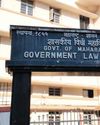
In December 2023, over 38,000 candidates wrote the Foreign Medical Graduates Exam (FMGE), the licensure exam that Indian graduates of foreign medical colleges have to pass to practise or study medicine further in India. Less than 23% of them passed. For the remaining 75% of examinees, their medical careers are e”ectively on hold until they clear.
This poor show in the screening exam is not a one-o” but has been the case in every session of the FMGE, for years. Thousands of students from India opt to study medicine abroad every year. Among the major reasons driving this growing trend are cost and the shortage of medical seats in India. A medical degree is cheaper in several countries than in many private medical colleges in India. Plus, it is easier to get into foreign medical colleges as well, given the cut-throat competition for the limited number of seats here. There were just over a lakh seats for the 23,81,833 candidates who registered for the National Eligibility cum Entrance Test (NEET UG) 2024.
That said, a foreign medical degree is no guarantee of a career in medicine in India. The NMC mandates the FMGE, and most don’t pass. Second, an analysis of medical colleges from which Indian students have written the FMGE casts doubt on the quality of medical education in several countries as well. Many colleges seem to be unaccredited; many are without hospitals or internship opportunities; some operations are so ad hoc they don’t even have a functioning website for the most part of the year.
The FMGE 2022 is the last round of the exam for which college and country-wise data on the number of students appearing for and clearing FMGE was available. Careers360 looked up these institutions and given below is what we found.
This story is from the {{IssueName}} edition of {{MagazineName}}.
Start your 7-day Magzter GOLD free trial to access thousands of curated premium stories, and 9,000+ magazines and newspapers.
Already a subscriber ? Sign In
This story is from the {{IssueName}} edition of {{MagazineName}}.
Start your 7-day Magzter GOLD free trial to access thousands of curated premium stories, and 9,000+ magazines and newspapers.
Already a subscriber? Sign In

Sleeper Cells: Law schools' 'dormant' legal aid clinics
A law college survey by the Supreme Court's policy centre found that a worrying number of legal aid clinics do little more than hold legal awareness camps, despite NALSA, BCI rules. This leaves gaps in legal education

Law's new niche frontiers
How niche law programmes are blending science with legal expertise, transforming legal education and creating specialised career paths

'GP Sir's classes' a ray of hope for the poor
Shrishti (name changed), 31, hails from the Valmiki community based in Gurdaspur, Punjab; she was born into a family of safai karamcharis - cleaners and at 21, married into another.

DU Law Faculty is part of CLAT 2025 but plans own exam: Dean
Delhi University's Faculty of Law will admit to its BBA LLB and BA LLB courses through the CLAT exam this year.

Studying law through films, novels, comics
Law schools are using various art forms - films, comics, theatre, puppetry

Legal education meets AI
As artificial intelligence reshapes industries, India’s leading law schools are introducing specialised courses and research initiatives, often in collaboration with technical institutions. But the need for comprehensive regulations persists

A LEGACY IN CRISIS
Asia's oldest law college and alma mater to legal luminaries, Government Law College, Mumbai, now grapples with declining standards, administrative apathy, and students' shifting educational aspirations

Law Colleges for 2025
Careers360 has ranked 100 law colleges and rated over 185 institutions, categorising them into distinct zones and states, for a comprehensive overview of legal education

IIT Madras introduces another quota
After admitting five students via the sports quota in 2024-25 - a first among the IITs Indian Institute of Technology Madras has now introduced another quota for \"fine arts and culture excellence\".

CLAT answer keys and court cases
Many Common Law Admission Test (CLAT) candidates claimed to find mistakes in its provisional and final answer keys.